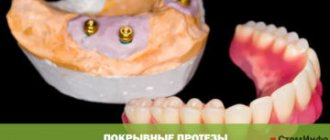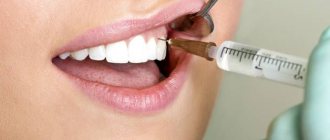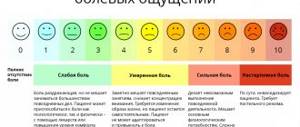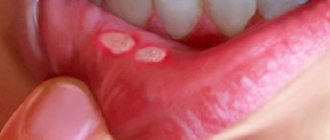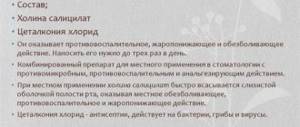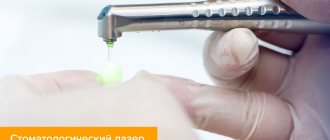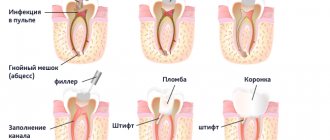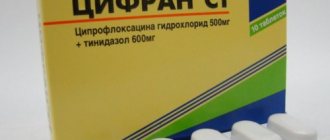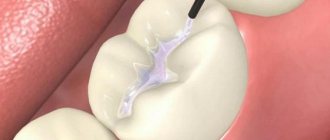Anti-inflammatory drugs Inflammation is the body's protective reaction to damage to the human body. In the case of the development of dental pathologies accompanied by inflammatory processes, doctors use anti-inflammatory drugs
.
Types of drugs for toothache
Acute toothache, known in medicine as odontalgia, is one of the most severe and difficult to tolerate. That is why it should be eliminated in a timely manner. As part of her drug treatment, analgesic, antispasmodic and complex drugs are used. Moreover, the choice should depend on the source of pain, the condition of the soft and bone tissues around it.
Accordingly, you first need to conduct the necessary clinical studies, then the doctor must check your medical history and choose the most optimal type of medication.
In exceptional cases, antibiotics can be used; they relieve pain and have a healing effect.
Analgesics affect the central nervous system, reducing the sensitivity of nerve endings near the bone tissue of the tooth. Therefore, the patient simply stops feeling pain. Antispasmodics act by relaxing smooth muscles and dilating blood vessels near them. Accordingly, blood flow is normalized and the wound is quickly restored. Complex drugs are considered the most optimal. The fact is that pain can be caused by any reason. And if there is simply no time to find out, you need to use such means. It remains to understand how to choose them wisely.
List of the best drugs
To eliminate the pain syndrome, strong drugs are selected, the action of which is based on dulling the sensitivity of the nerve endings both at the root of the tooth and around the jaws. But there are not many such drugs. The following names are considered to be the highest quality and most effective:
| Name | Main active ingredient | Manufacturer country |
| Ibuprofen | Ibuprofen | Serbia, Belarus, Ukraine |
| Nurofen | Ibuprofen | UK, Spain, Italy |
| Ketorol | Ketorolac | India |
| Amoxiclav | Amoxicillin | Austria |
| Took | Fenpiverinium bromide | India |
| Nise | Nimesulide | India |
| Lincomycin | Lincomycin | Russia |
If you want to stop an acute toothache, you should immediately consult a dentist. Only in this case will you be able to choose the right medicine and not make a mistake with the dosage or release form. And many are available only by prescription or are found only in dental clinics in the form of gels and injections for injection directly into the gums.
No matter how severe the pain, you cannot deviate from the standard dosage, regardless of the form of release of the drug.
But in order to get rid of pain, it is not enough to suppress it with medications; you must understand its nature and treat the damaged area. The cause of the pain may be some organic or physical change that only a doctor can correct. Therefore, even if you don’t like dentists, you need to gather your strength and overcome your fear. In addition, some of the drugs described in the table are available only by prescription. And others are found exclusively in dentists, so you can’t just drink them.
Ibuprofen
The main pharmacological actions of Ibuprofen are anti-inflammatory, antipyretic and analgesic, respectively. These features of the drug help with polymyalgia rheumatica, osteoarthritis and other diseases associated with pain in the musculoskeletal system and discomfort in the muscles. In dental practice, Ibuprofen is needed to numb the nerve endings in the area that hurts. Or if pus appears in the gums or the dental nerve is damaged, flux is diagnosed. It is necessary to remember some characteristics of this drug:
- distributed in the form of tablets, ointments and gel at 5%, suppositories and suspensions for children;
- dosage and regimen depend on which release form was chosen;
- this painkiller will cost 33-149 Russian rubles.
The medication is contraindicated in case of individual intolerance to the active substance. It is also not given for homeostasis disorders, progressive pathologies of the kidneys and liver, for gastric or intestinal bleeding, in the third trimester of pregnancy, and so on. Give Ibuprofen with caution for heart failure, gastritis, colitis, stomach ulcers at any stage of severity. This remedy poses some danger if the patient is a child under one year old, a nursing woman, or a person with an excessive penchant for strong alcoholic drinks.
In case of overdose, gastric lavage and further gradual symptomatic treatment are required.
The instructions for use indicate the following side effects - hearing loss, tinnitus, bronchospasms and hepatitis. You may experience tachycardia, anemia and increased sweating. When applied topically, there is a risk of itching at the treatment site and an unpleasant taste in the mouth if Ibuprofen is used in dentistry.
Nurofen
Nurofen helps with almost all types of pain - from menstrual pain to post-operative pain. Therefore, it is worth focusing on its use in dentistry. Nurofen is suitable for relieving pain from pinching the trigeminal nerve of the face, from damage to the tooth socket during treatment of caries, from tumors and gumboil, from the consequences of removing the hood of a wisdom tooth, that is, from pericoronitis. Dentists usually prescribe an oral form of the drug, since the gel has a bad effect on the oral mucosa. It must be remembered that:
- distributed in the form of gel and tablets in a digestible coating;
- the gel is used up to four times a day, and tablets of 200 milligrams should be taken three times a day;
- price - from 83 to 400 Russian rubles; in social pharmacies the medicine is cheaper.
The annotation mentions contraindications for both adults and children. Nurofen is not prescribed for heart failure, hemophilia, impaired liver and kidney function, and gastrointestinal bleeding. It poses a danger to nursing women, children under six years of age, and pregnant women in their last trimester. With long-term use of the drug, anemia, vomiting, heartburn, diarrhea, and erosion of the gastrointestinal tract are observed. In rare cases, allergic reactions and sensory disturbances occur.
Ketorol
Ketorol is a good medicine for pain, which, unfortunately, does not affect the progress of the disease. This pharmaceutical drug is effective for headaches, after surgery and injuries, for myalgia, and damage to peripheral nerves. Tablets are actively used by dentists if they need to reduce pain after caries treatment or tooth extraction at home. They also help in case of a violation of the structure of the dental canal, with a dental cyst or when installing a new crown. The features of Ketorol are as follows:
- in pharmacies you can find tablets for oral use, gel and injections for intravenous administration;
- the required dosage regimen is determined by the attending physician depending on the severity of the pain and other factors;
- this non-steroidal drug will cost 42-449 Russian rubles.
Ketorol is contraindicated in case of hypersensitivity to the components of the composition, with hemophilia, if the intestines are inflamed, or with some other characteristics of the body that the doctor will list. It is not given for intestinal and stomach erosions, pregnancy, childbirth and lactation. The medicine is also dangerous if the patient is under 16 years of age. About 3% of patients develop side effects. They may be plagued by swelling, headaches, and dizziness. Blood pressure drops less frequently, sweating increases and skin rashes occur.
Amoxiclav
Amoxiclav, a broad-spectrum antibiotic from the penicillin group, is used to treat gum inflammation medicinally. Moreover, it can be used for diseases of the upper and lower respiratory tract, infections of the skin and soft tissues. It also helps against gynecological diseases, lesions of the biliary or urinary tract. Additional indications are possible, determined during individual consultations with both dentists and other specialists. It is necessary to remember that:
- the drug is available in the form of tablets for oral use and suspension;
- up to 600 milligrams per day for adults and up to 10 milligrams per kilogram of weight for children;
- An antibiotic costs at least 110-799 rubles, the price depends on the region and the pharmacy’s markup.
It is prohibited to use Amoxiclav in dental practice if a person has been diagnosed with infectious mononucleosis or lymphocytic leukemia. It poses a danger in cases of high sensitivity to ibuprofen and in cases of previous diseases of the metabolic system. Cases of adverse reactions are rare. But some patients complain of general malaise, loss of appetite, vomiting, dizziness and weakness. Sometimes causeless itching occurs, and you may encounter hives or other external manifestations of allergies.
Took
When choosing between tablets and solution in the treatment of toothache, it is better to give preference to the former. They help with pain caused by spasms of smooth muscles, with neuralgia, dissection of the periosteum of the tooth and after surgery. It can even relieve pain that occurs during diagnostic procedures in the dental office. For indications from other areas, please consult your pharmacist or medical specialist. We must not forget about a number of features of this medicine:
- distributed in the form of tablets of 500, 5 and 0.1 milligrams, as well as in the form of a weakly concentrated solution;
- dosage depends on age, form of release and severity of pain;
- the price for this combined remedy is 63-444 Russian rubles, in social pharmacies it is lower.
Doctors often call this name when asked what antibiotics to take for tooth inflammation. But you need to be prepared for an acute allergic reaction, including anaphylactic shock, stomatitis or low blood pressure. Also, Bral should not be prescribed in any form if there is insufficient blood supply to the brain, with increased sensitivity, or with a body weight of less than five kilograms. It is harmful during pregnancy or breastfeeding. It is also not recommended to be used during the treatment of glaucoma.
Nise
The main indication for use of Nise is headache and toothache. Most often, this drug helps during the removal of a wisdom tooth, in the treatment of gumboil, or in the healing of gums after orthodontic intervention. Other indications for the use of Nise are fevers of various origins, osteoarthritis, osteoarthritis, rheumatoid arthritis. You can also use it to relieve pain after injuries and bruises of the limbs. There are a number of characteristics to remember about Nise:
- this medicine is produced in the form of tablets of 50 and 100 milligrams, as well as in the form of a gel;
- tablets give 100 milligrams twice a day, and the maximum dose of the gel is 30 milligrams;
- prices start from 198 Russian rubles.
Contraindications are peptic ulcer disease, renal and liver failure. Nise should not be given if you are hypersensitive to the active substance, as well as during pregnancy and lactation. The drug should be given with caution in case of diabetes mellitus, hypertension and lupus erythematosus. Side effects from using Nise include bronchospasms, urticaria, itching at the treatment site, and headache. Some experience diarrhea, fluid retention and flaking. It is dangerous to combine it with treatment with folk or homeopathic remedies.
Lincomycin
Lincomycin is prescribed for purulent and infectious diseases of the skin. But it is important that the pathogen-microorganism is sensitive to the active substance, therefore the main diseases are erysipelas, mastitis, furunculosis and abscess. Injections are sometimes used before medical intervention in dental clinics. More often, Lincomycin is prescribed for periodontitis, periodontitis, gingivitis and purulent abscesses. Other indications are determined individually and only by a doctor. It is necessary to remember some features of these capsules and injections:
- the drug is distributed in the form of liquids for injection and capsules for oral use;
- the dosage is prescribed on an individual basis, since the doctor must take into account the medical history;
- This medication will cost 71-177 rubles.
The medicine can cause gastrointestinal disorders, including vomiting, pain in the abdominal area, bowel movements and eating behavior. Also, patients using Lincomycin experience weakness, itchy skin, urticaria and other unpleasant side effects from the antibiotic. It should not be used if you are highly sensitive to lincosamides or have kidney or liver diseases. Lincomycin can be harmful if the patient is no more than six years old.
Steroidal anti-inflammatory drugs
Anti-inflammatory drugs
Steroid anti-inflammatory drugs
(SPVP) or glucocorticoids are a synthetic analogue of adrenal hormones. The spectrum of their action includes anti-inflammatory, desensitizing, antiallergic effects.
They also have immunosuppressive and antitoxic properties. For dental purposes, steroidal anti-inflammatory drugs are used mainly topically. These drugs are used using systemic methods, and this in turn leads to many side effects and pronounced complications.
Steroid drugs are prescribed for hypertrophic gingivitis and acute stages of inflammation. To treat these diseases, dentists prefer ointments with glucocorticoids - fluorocort, lorigden, deperzolon, and others. Ointments are applied in a thin layer to periodontal pockets or used as therapeutic dressings. Steroid anti-inflammatory drugs are contraindicated for tuberculosis, ulcerative and fungal diseases, cancer and at any stage of pregnancy.
A side effect may include atrophy of the skin and oral mucosa; if the use of SPVP is abruptly stopped, a reverse exacerbation of the process is possible. Due to such serious side effects, the use of steroidal anti-inflammatory drugs is possible only with a clear indication and under the full supervision of the attending physician.
data-yashareQuickServices=”yaru,vkontakte,facebook,twitter,odnoklassniki,moimir,gplus” data-yashareTheme=”counter”
>
Conclusions about the treatment of dental inflammation
Before using medications for dental pain, you need to get your doctor's consent. Only a professional dentist can quickly determine the required daily dosage and draw correct conclusions about the patient’s condition based on research data and anamnesis. If unbearable pain prevents you from working or sleeping, you need to choose the drug yourself. Pharmacies offer a wide selection of painkillers, and the most popular ones have been described in this article. It is only important to follow the correct dosages and remember the potential negative responses of the body.
Features of care
It is difficult to keep teeth healthy. Gum disease, caries - all these problems are familiar to every person. In order to minimize the risk of developing unwanted oral diseases, it is important to maintain hygiene and monitor your dental health.
In addition to the unpleasant odor that appears from the mouth of the owner of unhealthy teeth, bacteria entering the stomach and esophagus cause serious illnesses.
The Aptstore pharmacy offers a variety of products recommended by dentists for oral hygiene. Dentists advise choosing medium-hard toothbrushes that perfectly remove plaque without damaging the gums. From the catalog you can order ultrasonic and electric brushes that promote blood microcirculation.
On the shelves of the Aptstore pharmacy chain there is a large assortment of toothpastes:
- for sore gums;
- for sensitive teeth;
- preventive with medicinal herbs;
- whitening;
- with increased amounts of calcium or fluoride
Pharmacy workers from the Aptstore network will help you choose toothpaste, taking into account the individual characteristics of the client. In addition to toothpastes, you can place an order for tooth powders containing antibacterial substances that destroy caries pathogens.
There are also mouth rinses in the catalog and in retail sales, the systematic use of which guarantees reliable protection of gums from inflammation and teeth from destruction.
Among the additional dental preparations offered to customers in the Aptstore pharmacy chain, we highlight dental sticks, floss, interdental brushes, and irrigators.
Dentists recommend using brushes and irrigators for patients who have implants installed.
